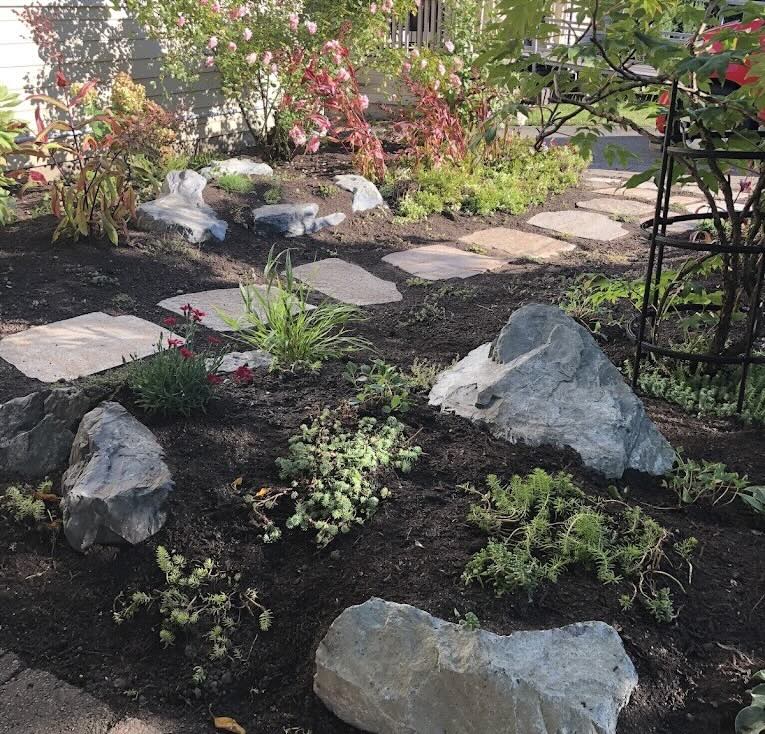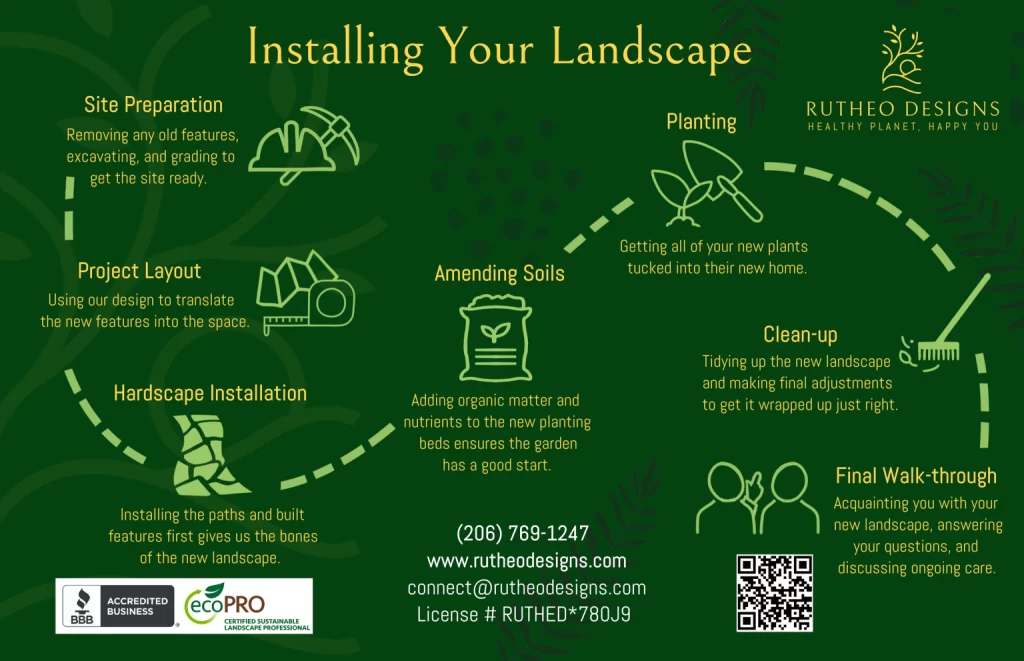
Sustainable irrigation refers to the practice of watering landscapes in a way that conserves water and protects the environment. In eco-friendly landscaping, sustainable irrigation ensures that plants receive the right amount of water while minimizing waste, energy use, and pollution. This approach contrasts with traditional irrigation systems, which often result in overwatering and water runoff, leading to wastage and environmental harm.
Sustainable irrigation systems are designed to work in harmony with natural processes. For Seattle, a region known for its seasonal rainfall and varying microclimates, this method helps make the most of local water resources. By implementing water-saving technologies and strategies, sustainable irrigation protects ecosystems while keeping landscapes healthy.
One of the most effective systems for sustainable irrigation is drip irrigation. Drip irrigation minimizes water waste by delivering water directly to the root zones of plants, ensuring that every drop is used efficiently. In this system, water slowly drips through tubes or emitters, providing a targeted and controlled amount of moisture.
For Seattle’s climate, which experiences significant seasonal variations in rainfall, drip irrigation is ideal for both residential and commercial landscapes. It reduces water usage by up to 50% compared to traditional sprinkler systems, making it especially effective for areas with drought-resistant or native plants. The ability to adjust water delivery based on soil conditions and plant needs also makes drip irrigation highly adaptable to Seattle’s diverse soils.
While traditional sprinkler systems can be wasteful, modern water-efficient sprinkler systems offer a more sustainable alternative. These systems incorporate technology such as low-flow heads and weather-responsive smart controllers that adjust watering schedules based on real-time weather data. This feature ensures that landscapes are watered only when necessary, preventing over-irrigation.
Placement strategies also play a key role in minimizing runoff and water waste in sprinkler systems. For instance, ensuring sprinklers are positioned away from driveways and sidewalks and instead focused on green spaces optimizes water usage. In Seattle, where heavy rainfall can be unpredictable, smart sprinkler systems that account for weather patterns are a highly efficient choice for maintaining a sustainable landscape.
Rainwater harvesting is another excellent option for sustainable irrigation in Seattle. With an average annual rainfall of around 38 inches, the region offers substantial potential for collecting rainwater. By installing rainwater collection systems, both residential and commercial properties can reduce their dependency on municipal water sources.
Rainwater harvesting systems typically involve collecting and storing rainwater from roofs and other surfaces in tanks or barrels, which can then be used for irrigation. Not only does this reduce water bills, but it also helps manage stormwater runoff, which is a key environmental concern in urban areas. Utilizing harvested rainwater for irrigation aligns with Seattle’s climate and promotes long-term water conservation.
Effective irrigation timing is essential to reduce water evaporation and ensure optimal plant hydration. In Seattle, watering early in the morning or late in the evening is ideal to minimize water loss from evaporation. Additionally, adjusting irrigation schedules based on the season is key to maximizing water efficiency.
During the cooler, wetter months, irrigation can be reduced, while in the drier summer season, plants may need more frequent watering. Smart irrigation controllers, which adjust watering schedules based on weather patterns and soil moisture levels, are especially valuable in this regard. These automated systems ensure that plants receive the right amount of water, regardless of fluctuations in Seattle’s weather.
The type of soil in a landscape significantly affects water retention. In Seattle, soils can vary from sandy loams to heavier clay soils, and understanding these characteristics is crucial when designing irrigation systems. Sandy soils drain quickly, requiring more frequent watering, while clay soils retain moisture for longer, reducing the need for constant irrigation.
To promote water conservation, it’s also important to choose drought-resistant and native plants that are well-suited to Seattle’s environment. Native plants are naturally adapted to local rainfall patterns, requiring less water and maintenance. Additionally, amending soil with organic matter, such as compost, can improve water retention and help ensure that irrigation systems operate efficiently.
In sustainable landscaping, several water conservation techniques can further optimize irrigation. Mulching, for example, helps retain moisture in the soil by reducing evaporation. Applying a thick layer of mulch around plants also helps regulate soil temperature and suppress weeds, contributing to overall landscape health.
Another technique is hydrozoning, which involves grouping plants with similar water needs together. This allows irrigation systems to be more precise in delivering the right amount of water to each zone, further reducing waste. Additionally, incorporating swales and rain gardens can help manage excess water by directing it into areas where it can be absorbed and used by plants rather than contributing to runoff.

At Rutheo Designs, we are dedicated to transforming your outdoor spaces into beautiful, sustainable landscapes that reflect your vision and the unique character of the Seattle area. Whether you’re looking to enhance your garden with native plants, need expert advice on water-efficient irrigation systems, or want to discuss a comprehensive landscape design, our team is here to assist you every step of the way. We understand that every project is unique, and we take the time to listen to your needs and offer personalized solutions that align with your goals and the local environment.
Our services cover everything from initial consultation and design to full installation of hardscaping, softscaping, irrigation systems, and outdoor lighting. We ensure each element of your landscape is expertly installed and ready to thrive for years to come.
We invite you to reach out to us to start the conversation about your landscaping needs. You can contact us by email at connect@rutheodesigns.com or give us a call at (360) 844-2989. Whether you have specific questions or are ready to schedule a consultation, we’re eager to help you bring your outdoor vision to life with the care and expertise that Rutheo Designs is known for.